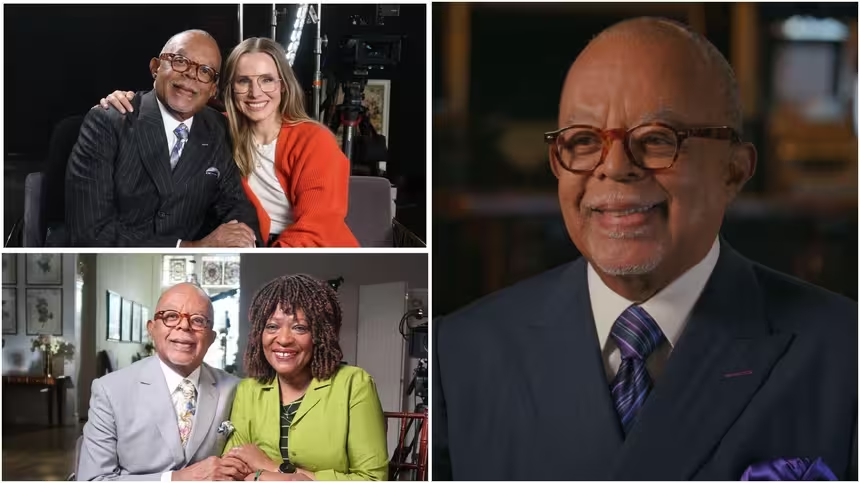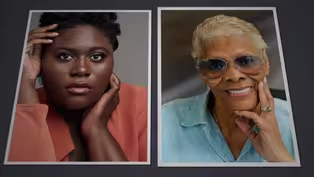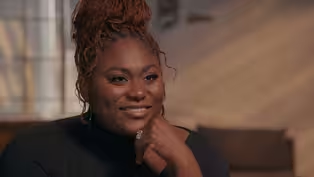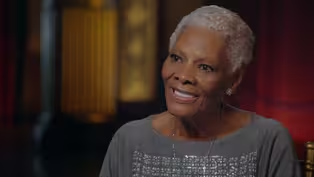Finding Your Roots
Dionne Warwick Explores the Roots of Her Singing Grandfather
Clip: Season 10 Episode 7 | 6m 44sVideo has Closed Captions
Dionne Warwick explores her family history, focusing on her maternal grandfather.
Dionne Warwick explores her family history, focusing on her maternal grandfather, Nitch (Nicholas Drinkard). Through research, she discovers that Nitch's grandparents, John Drinkard Sr. and his wife, owned land in Georgia in the early 1900s, which was uncommon for African-Americans at the time. The Drinkards likely farmed cotton before relocating to Newark, New Jersey, by the late 1920s.
Problems playing video? | Closed Captioning Feedback
Problems playing video? | Closed Captioning Feedback
Corporate support for Season 11 of FINDING YOUR ROOTS WITH HENRY LOUIS GATES, JR. is provided by Gilead Sciences, Inc., Ancestry® and Johnson & Johnson. Major support is provided by...
Finding Your Roots
Dionne Warwick Explores the Roots of Her Singing Grandfather
Clip: Season 10 Episode 7 | 6m 44sVideo has Closed Captions
Dionne Warwick explores her family history, focusing on her maternal grandfather, Nitch (Nicholas Drinkard). Through research, she discovers that Nitch's grandparents, John Drinkard Sr. and his wife, owned land in Georgia in the early 1900s, which was uncommon for African-Americans at the time. The Drinkards likely farmed cotton before relocating to Newark, New Jersey, by the late 1920s.
Problems playing video? | Closed Captioning Feedback
How to Watch Finding Your Roots
Finding Your Roots is available to stream on pbs.org and the free PBS App, available on iPhone, Apple TV, Android TV, Android smartphones, Amazon Fire TV, Amazon Fire Tablet, Roku, Samsung Smart TV, and Vizio.
Buy Now

Explore More Finding Your Roots
A new season of Finding Your Roots is premiering January 7th! Stream now past episodes and tune in to PBS on Tuesdays at 8/7 for all-new episodes as renowned scholar Dr. Henry Louis Gates, Jr. guides influential guests into their roots, uncovering deep secrets, hidden identities and lost ancestors.Providing Support for PBS.org
Learn Moreabout PBS online sponsorshipTurning back to Dionne Warwick, we focused on her maternal grandfather, a man named Nitch, or Nitcholas Drinkard.
Nitch was a fixture of Dionne's childhood, and she vividly recalls his beautiful tenor voice, but Dionne knew almost nothing about her grandfather's roots.
We set out to change that and traced Nitch back two generations to his grandfather, John Drinkard, Sr. John is Dionne's great-great-grandfather, and we noticed something unusual about him.
He and his wife owned a farm in Georgia in the early 1900s, a time when most African-Americans in the South were landless sharecroppers.
"This indenture, made and entered into the 11th day of August, for the consideration of a sum of $60, all that tract or parcel of land situate, lying, and being in the county of Early."
You know what you're looking at?
The deed?
The deed!
Of them buying their land.
- Yeah.
- Isn't that cool?
That's your great-great-grandparents purchasing their land, and you could see a map of your family's property on the left.
That's the Drinkard family land.
What's it like to see that?
It's amazing, especially during that period of time.
Yeah, absolutely.
That's fabulous.
The Drinkards owned a substantial farm near the border of Georgia and Alabama, where they likely grew cotton, the staple crop of the region.
But they didn't stay on the farm for long.
By the late 1920s, they'd resettled in Newark, New Jersey, just miles from where Dionne would be born and raised.
Did you ever hear any stories about why the family came north and what happened to that land?
Never ever.
I didn't even know there was land.
Okay.
Please turn the page.
Sure.
This is a newspaper article from September, 1919.
Could you please read that transcribed section?
"Weevils, caterpillars, spiders, and rain have combined to make almost a complete failure of Early county's cotton crop this season.
Price is low, and only those who need the money are selling."
Well, you know what a boll weevil is?
Yeah.
Boll weevils are beetles that eat cotton buds and flowers, and a boll weevil infestation made its way to Georgia in August, 1915.
By the end of 1919, the state had experienced $40 million in losses.
That's worth $690 million today.
Wow.
Two years later in 1921, the University of Georgia published a report, stating that the boll weevil, quote, "has disturbed our economic situation more than any other single factor since the conclusion of the Civil War."
So this was affecting your ancestors, 'cause that's how they were making- - Farmers, yeah.
- Yeah.
Crazy.
We can't be certain how this catastrophe impacted the Drinkard farm.
There are no records to tell us.
All we know is that in 1923, Dionne's grandfather Nitch defaulted on a bank loan and his family's property was sold at auction.
How do you think your grandfather felt?
It must have been devastating.
It had to be, you know?
Your mom was just three years old.
Yeah, Grandfather was a proud man.
Did he ever talk about this?
No, mm-mm.
I don't know why, but historical things of this nature that we're discussing today, was never, ever mentioned or talked about.
Why do you think?
Too painful?
Could possibly have been that, you know?
People think, "Well, if I don't tell 'em, why-" Why make them suffer like I did?
Yeah, well, let's see what your family did next.
Could you please turn the page?
This is the 1930 census for Newark.
Would you please read the first transcribed section on the top left?
"Nitcholas Drinkard, head, 34, molder at Essex Foundry.
Delia Mae, wife, 27, housewife.
Willie D., son, 11.
Arthur Lee, daughter, 9.
Marie, daughter, 7.
Hansom, son, 5.
Annie M., daughter, 3."
- All these people I knew.
- Yeah.
What do you think it was like for them to start a new life in a completely different place after all that history that they had in Georgia?
- Yeah.
- You know?
It must have been quite interesting to go from- A farm.
Yeah, into factories and doing things they didn't know nothing about.
After moving north, Nitch took a job in a metal foundry, but that wasn't all he did in his new home.
Sometime in the early 1940s, he formed a family gospel group and named them the Drinkard Jubilairs.
Tell me about this.
How was the group first created?
My grandfather, he loved to sing.
He had a voice that was angelic and he knew his children could sing.
And these are his children.
It's my Uncle Nicky, my Aunt Annie, my Aunt Reebie, Uncle Larry, Aunt Cissy.
So what do you think that music meant to him, especially after losing the land, his family's inheritance, being forced to come north and then starting all over?
Started all over again.
- Yeah.
- Yeah.
I'm certain that it was a jubilation for him, you know?
Which I think is probably why they were called Jubilairs.
- Yeah.
- But knowing that his children had that kind of talent and being able to sustain it and give it foundation, had to be a wonderful feeling.
Video has Closed Captions
Preview: S10 Ep7 | 32s | Henry Louis Gates, Jr. shares ancestry with actor Danielle Brooks & singer Dionne Warwick. (32s)
Danielle Brooks Learns the Dollar Value of Her Ancestors
Video has Closed Captions
Clip: S10 Ep7 | 6m 42s | Danielle Brooks learns the dollar value of her enslaved fifth great-grandparents. (6m 42s)
Dionne Warwick Reflects on the Ugly Legacy Slavery
Video has Closed Captions
Clip: S10 Ep7 | 5m 44s | Dionne Warwick reacts powerfully to seeing her ancestor listed in an 1870 slave schedule. (5m 44s)
Providing Support for PBS.org
Learn Moreabout PBS online sponsorship
- History
Great Migrations: A People on The Move
Great Migrations explores how a series of Black migrations have shaped America.












Support for PBS provided by:










